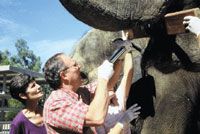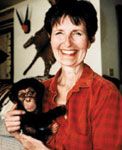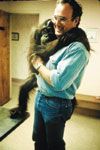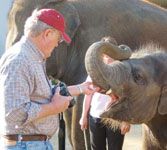Vets to the stars recalls stories, lessons learned on the set
Thousand Oaks, Calif. - One might think life as a veterinarian to the animal stars would be filled with glamour and excitement.
THOUSAND OAKS, CALIF. — One might think life as a veterinarian to animal stars would be filled with glamour and excitement.

Veterinarians to the stars: From chimps to big cats, Drs. Jim and Linda Peddie have seen it all during their more than 15 years as movie set veterinarians.
But Dr. Jim Peddie says it's really filled with 747s full of hay and tubs of Pepto Bismol.
Veterinarians Peddie and his wife, Linda, know these stories of a veterinarian's life behind the movies scenes all too well. The couple, both graduates of the Cornell University College of Veterinary Medicine Class of 1965, worked for about 15 years with Holly-wood's animal actors.

They cared for the stars of 68 feature films, including "Dances With Wolves," "Operation Dumbo Drop" and "Evan Almighty," as well as 27 television series like "Frasier" and "Full House."
And as for visions of lounging on sets, hobnobbing with celebrities, Peddie laughs off the notion, saying the work wasn't always pretty, but it was always satisfying.
"If your job is a veterinarian, you don't get on set a lot. They'll call you and say while they were working with this animal, something happened that they are concerned about," Peddie says, explaining most of the calls he got were from animal handlers and trainers after hours, once the animals were back home for the day. "You'll work 24 hours a day."

One time he remembers being called to a set to deal with a case of "explosive diarrhea" that hit an elephant that was supposed to appear as though it were on water skis.
"She was on stage and they were deliberately moving it underneath her. But the movement of the ground under her feet ... poor thing," Peddie recalls, explaining his remedy. "I went to a drug store, bought gallons of Pepto Bismol and she loved it."
The Peddies have done a lot of work with elephants, he says, speaking lovingly of one patient he calls "a human in an elephant suit." The elephant named Thai has starred in films like "George of the Jungle" and "Operation Dumbo Drop." Thai's overseas role in "Operation Dumbo Drop," however, presented Peddie with one of his biggest medical challenges. While in Thailand for filming, without Peddie, the animal got very sick and wouldn't eat, he says. Trying to make his diagnosis from a half a world away, Peddie finally decided that Thai must not have liked the local vegetation she was being fed and maybe had a slight infection from the native water.

The more difficult aspect of the case came with the solution, though — how to get an elephant's diet overseas. In the end, Thai ended up drinking — 150 to 200 gallons a day — and bathing in bottled water, and Peddie chartered a 747, which he filled with hay.
"It was the most expensive hay ride in the world," he laughs.
Other unique cases include discovering encephalitis in big cats, before anyone knew they were susceptible to canine distemper virus, Jim says, and finding amoebic meningitis in an orangutan.
But solving non-medical problems was the biggest part of the job, Peddie says, adding it was an aspect at which his wife became particularly talented.
"She became so good at moving animals around the world that occasionally the U.S. Department of Agriculture would encounter the same problems we were running into and call for help. How do you get the airline to accept a load of animals to some foreign country? There's always ways to get through that maze," he says.
One of the easiest parts of the job — much different from the life of a small-or mixed-animal veterinarian — is dealing with clients, he says.
"The owner and trainer are usually the same person. They raised these animals from birth. You've developed this understanding with the animal," Peddie says. "The animals are family to these people. One of the neat things about doing film work was we worked with humans who had the animal's interest as their highest priority and that made an awful lot of decisions that a practitioner has to face nonexistent. It was never an issue of what to spend."
He didn't particularly like caring for some animals, though, like black leopards, which Peddie says made him a little nervous.
A female leopard is the kind of animal that set Peddie's career on the exotics and film path, though.
"It was a baptism-by-fire type of thing," he says, laughing now, so many years later.
After graduating from veterinary school, marrying and serving in the Army, Peddie says he started his first job in a general practice in Thousand Oaks, Calif. The senior veterinarian was his mentor, Dr. Robert M. Miller, who had a philosophy that if an animal is sick, a veterinarian should treat it, whether they were trained with exotic animals or not.
One night shortly after starting at the practice, Peddie says he had to help a leopard at a local exotic animal importing business when all the senior veterinarians were away. It was his first experience with an exotic.
"It was a female leopard. She had attempted to deliver three full-term kittens and ruptured her uterus and got a terrible infection in her abdomen," Peddie says.
"I was absolutely scared to death. The owner of the animal happened to be the owner of the facility and was not at all pleased I was there. He used to call me the 'kid vet.'"
But then Peddie changed his way of thinking with a piece of advice he now gives to students or anyone hoping to work with exotics.
"You have to move your mind set. When you're faced with an animal you've never seen before, you tend to focus on, 'Oh my gosh, it's a leopard.' Forget that it's a leopard. Move it into a species you have a comfort level with," Peddie says. "Think of it as being a cat that's presenting the same symptoms. It gets you thinking diagnostically and therapeutically about how to resolve the problem. I used that same mind set many times."
After successfully treating his first leopard, Peddie says the practice, where he worked for 24 years, became involved with a few nearby film studios.
When he and his wife began taking care of the animals at Universal Studios' city walk section in 1991 at the request of the animal training company Birds and Animals Unlimited, they "broke into the inner circle" of Hollywood and started being contacted for work by all the major studios, Peddie says.
Health problems have forced Peddie to cut back drastically on his film work, but he says many of the owners and trainers became personal friends and he still cares for their animals.
To students who have aspirations of caring for film animals, primarily exotics, Peddie has a few words of advice.
"Don't hesitate when you're asked to see something that's out of the ordinary. Accept the challenge that's there and say, 'Okay. I'll do my best and get involved.' Don't automatically step away," Peddie says.
"Be more adventurous."